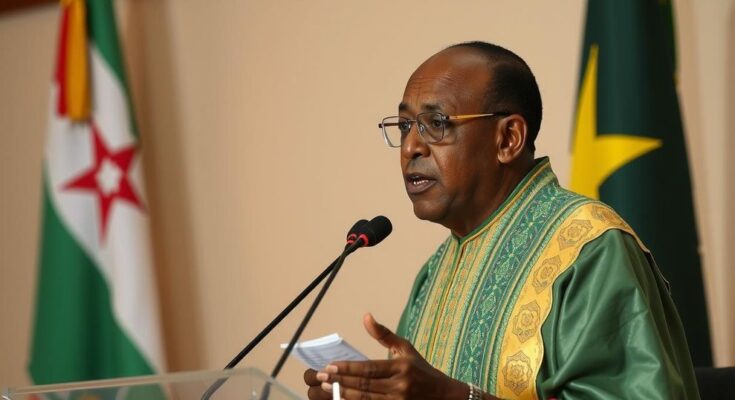Somalia’s Foreign Minister Ahmed Moalim Fiqi has rejected claims that Somalia agreed to grant Ethiopia access to the Red Sea, affirming the country’s commitment to sovereignty and transparency. This denial follows claims related to the Ankara Declaration, which aims to ease tensions after Ethiopia’s MoU with Somaliland. Eritrea and Egypt oppose this, viewing it as a threat to regional stability, thus highlighting prevalent diplomatic challenges in the Horn of Africa.
MOGADISHU, Somalia – In a recent declaration, Somalia’s Foreign Minister Ahmed Moalim Fiqi has categorically denied any agreements that would grant Ethiopia access to the Red Sea, labeling the assertions as unfounded. Minister Fiqi emphasized Somalia’s commitment to protecting its sovereignty and maintaining transparency concerning national matters. This statement serves as a direct rebuttal to previous claims suggesting such an arrangement was reached during the Ankara Declaration, an agreement reportedly facilitated by Turkish President Recep Tayyip Erdoğan on December 11, 2024.
The Ankara Declaration was intended to address and alleviate the existing tensions between Somalia and Ethiopia, particularly in the wake of a controversial Memorandum of Understanding (MoU) signed by Ethiopia with Somaliland on January 1, 2024. This MoU ostensibly granted Ethiopia the sought-after access to the Red Sea, as Somaliland pursued international recognition as an independent state. Furthermore, the agreement stipulated the creation of technical committees aimed at resolving maritime disputes, establishing a deadline for resolution by mid-2025.
However, the purported agreement has ignited considerable controversy, particularly among the Tripartite Alliance of Somalia, Eritrea, and Egypt, all of which view Ethiopia’s ambitions for Red Sea access as a potential threat to regional stability. Eritrea’s Foreign Ministry advisor, Abdulkadir Idris, has voiced strong opposition to the agreement, arguing that it jeopardizes Somalia’s sovereignty and could lead to destabilization in the region. Ahmad’s assertions underscore the complexity of regional diplomacy as tensions continue to simmer.
In remarks to BBC Somali, Idris characterized the agreement as “hasty and poorly conceived,” expressing concern over Somalia’s prompt acceptance of the deal, which he fears could strain essential alliances and precipitate diplomatic discord.
The ongoing tensions between Somalia and Ethiopia have significant implications for regional stability and security in the Horn of Africa. Ethiopia’s efforts to gain access to the Red Sea have historically been met with resistance from neighboring nations, especially Eritrea and Egypt, who perceive such moves as a threat to their respective national interests and regional equilibrium. The Ankara Declaration represents an attempt to mediate these tensions, but the reaction from Eritrea and Egypt indicates deep-seated fears of shifting power dynamics in the region.
In conclusion, Somalia’s Foreign Minister Ahmed Moalim Fiqi has firmly denied allegations that his country has granted Ethiopia access to the Red Sea, which underscores Somalia’s dedication to sovereignty and transparent governance. The controversy surrounding the Ankara Declaration reflects broader regional tensions, particularly as Eritrea and Egypt raise alarms over the implications of Ethiopia’s maritime ambitions. These developments highlight the delicate and intricate nature of diplomatic relations within the Horn of Africa, necessitating careful navigation to maintain peace and stability.
Original Source: hornobserver.com




